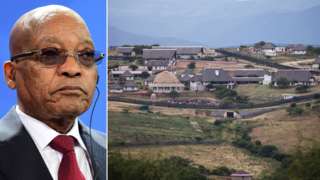JOHANNESBURG, (Reuters) – South Africa’s constitutional court ordered President Jacob Zuma today to pay back some of the $16 million of state money spent upgrading his private home, a stinging rebuke that hits the scandal-plagued leader financially and politically.
The unanimous ruling by the 11-judge court, a central pillar of the democracy established at the end of apartheid, said Zuma had failed to “uphold, defend and respect” the constitution by ignoring the Public Protector’s findings on his sprawling rural residence at Nkandla in KwaZulu-Natal.
In 2014, the constitutionally mandated anti-corruption watchdog identified a swimming pool, cattle enclosure, chicken run, amphitheatre and visitor centre as non-security items that Zuma must pay for.
Chief Justice Mogoeng Mogoeng gave the Treasury 60 days in which to determine their “reasonable cost”, after which Zuma would have a further 45 days to pay.
Besides hurting Zuma, the ruling was a vindication for Public Protector Thuli Madonsela, a quietly spoken but steely lawyer described by Mogoeng as “the embodiment of the Biblical David” fighting against the Goliath of state corruption.
“The office of the Public Protector is one of the true crusaders and champions of anti-corruption and clean governance,” Mogoeng said. “Hers are indeed very wide powers that leave no lever of government power above scrutiny.”
In a short statement, Zuma’s office said it respected the ruling and would determine the appropriate action in due course.
The uncompromising nature of his verdict – Mogoeng said it carried a “profound lesson” for South Africa’s young democracy – piles more pressure on Zuma, whose second term in office is due to end in 2019.
In a final, departing insult, he was ordered to pay costs.
Standing outside the court in downtown Johannesburg, opposition leader Mmusi Maimane told reporters Zuma should be removed from office and said he would table a parliamentary motion to have him impeached.
Zuma, a 73-year-old polygamous Zulu traditionalist, has been under intense fire since December when his abrupt sacking of finance minister Nhlanhla Nene sent the rand into a tail-spin.
The rand firmed to a near-four month high against the dollar as Mogoeng delivered his ruling.
The African National Congress (ANC) said it was studying the decision in detail given the “serious nature” of its findings.
Its majority in parliament will almost certainly give Zuma political cover against any attempt to impeach him, but the judicial rebuke may embolden anti-Zuma factions within the ruling party to mount a challenge.
“It’s a major decision that is going to have a significant impact on our political environment,” said Gary van Staden, political analyst at NKC African Economics.
“In most other places in the world it would be terminal for President Zuma but we will have to wait and see to how the balance of forces are playing out in the ANC.”
“FIRE POOL”
 Much of the court’s ruling focused on whether the findings and recommendations of a 2014 report by Madonsela into security upgrades at Nkandla were legally binding.
Much of the court’s ruling focused on whether the findings and recommendations of a 2014 report by Madonsela into security upgrades at Nkandla were legally binding.
Mogoeng made it very clear they were, saying the office would be a pointless institution if its findings could be ignored “willy nilly”.
Over the last two years, Zuma has refused to comply, instead ordering parallel investigations by the public works and police ministries that exonerated him, based on declarations that included calling the swimming pool a fire-fighting reservoir.
Madonsela did not put a price tag on the five non-security features she identified.
However, her report cited Public Works Department document that outlined estimated costs of 2.8 million rand ($187,000) for a swimming pool and parking garage for VIP guests, and 1.2 million rand for a ‘cattle culvert’.
As president, Zuma’s annual salary is 2.7 million rand. If any payments are made on his behalf, they would be liable for income tax at 41 percent.
Last month, Zuma’s legal team admitted they were worried about political fallout from the case in mid-year provincial elections, urging the court not to wander too far from its explicitly legal mandate.
“This is a delicate time in a dangerous year,” his lawyer, Jeremy Gauntlett, told the court. “It will be wrong if this court makes a ruling which may result in a call for impeachment.”









